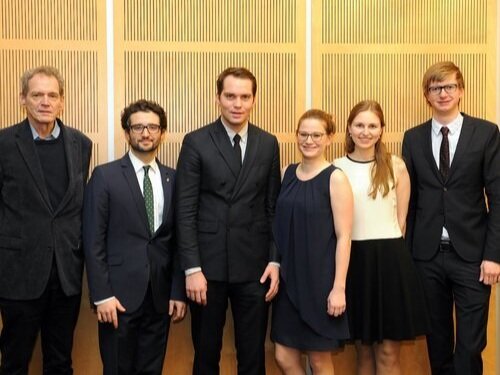Obermayer German Jewish History Award
Kurt-Willi Julius and Karl-Heinz Stadtler
Voehl, Hesse
A small apple tree flourishes behind the synagogue in the town of Voehl. Karl-Heinz Stadtler, Kurt-Willi Julius, and their co-workers at the nonprofit community foundation, Foerderkreis Synagogue in Voehl, have been caring for the tree since September 2000, when it was planted by fifteen Jewish visitors from outside the country. These former residents and their descendents gathered in Voehl fifty-eight years after the Nazi deportation of northern Hesse's last Jews. "It's a symbol of reconciliation," says Karl-Heinz Stadtler of the tree and its care.
Inviting the visitors was just a first step on the road of reconciliation taken by the 200 Foerderkreis members. Led by Stadtler and Julius, the group was formed in 1999 to purchase the building that had once housed the Voehl synagogue. The aim of the group has been not just to restore the building, but also the memory of Jewish life in Voehl. The building functions as an important cultural center and also is being expanded to include a museum.
Cultural events at the Voehl synagogue attract up to 3,000 people each year. The Foerderkreis supports Jewish historical research, organizes commemoration ceremonies for Kristallnacht, and programs Jewish music concerts, theater events, and art exhibitions. The Foerderkreis's programming also includes lectures by Jewish survivors, modern Israeli dance, and occasional Shabbat services and holiday celebrations. "We want to keep Jewish culture alive in multiple ways," Kurt-Willi Julius states emphatically. "Although it is crucial to remember the Nazi era, we don't want to limit ourselves to this; it would be counterproductive for reconciliation and the future."
Julius and Stadtler are both teachers. Both are outgoing, energetic, and dedicated, but they bring diverse yet complementary skills and interests to the group. "They have different personalities, and they work well together," says Foerderkreis member Guenter Maier. Karl-Heinz Stadtler researches and writes about the Jewish history of Voehl and its surrounding villages. He also leads tours of the town's former Jewish houses and businesses, as well as the synagogue. With an interest in arts and the media, Kurt-Willi Julius is the publisher of Stadtler's work; he created and maintains the impressive website <http://www.synagoge-voehl.de> which features profiles of Jewish life. He also organizes cultural programs, does the fundraising, and oversees the renovation of the synagogue.
As a history teacher, Karl-Heinz Stadtler had long been sensitized to Germany's difficult past. When he became a member of the town council in the 1990s, he pressed for a monument commemorating the deported Voehl Jews. This catapulted him into his research on the region's Jewish history. In 1999, when he discovered that the old synagogue building was for sale, he spearheaded the creation of the Foerderkreis, through which the synagogue was purchased with municipal aid. As regional chair of the Social Democratic Party, his political network is extensive—even the town's mayor and members of the Hessian and national parliaments have become members of the Foerderkreis. "Stadtler has been the engine for this project," says Voehl's mayor Harald Plünnecke.
Stadtler may have been the engine, but Kurt-Willi Julius, as chair of the Foerderkreis, is its operational head. A peace activist since the 1980s, Julius was shocked when he learned through a television documentary that more synagogues had been destroyed after the war than during Nazi rule. "When the former synagogue went up for sale, I saw it as an opportunity to do something positive in the community," says Julius. Shortly before, he had met his Jewish partner. "Through her, my commitment has become much more personal, rather than just political," he explains. For the last seven years, they have been raising her four children in both Jewish and Christian traditions.
The Foerderkreis organized the visit of those fifteen Jewish visitors as a launching event for the project. As one of many symbolical acts of reconciliation, its members arranged a special ceremony in the former synagogue. For one visitor, Carol Baird of San Francisco, it was an extremely emotional event. She and her family, along with twelve locals, celebrated her and her husband's thirtieth wedding anniversary in the synagogue where her grandparents had married eighty years earlier. "My family has found its rightful place back in the town where our ancestors were born, celebrated bar mitzvahs, married, and died, " she says.
Today the outside of the building has been restored; the sanctuary of the synagogue will be complete by summer 2006. Construction on the interior museum space will proceed for the next few years. Meanwhile, the Foerderkreis will continue to cultivate the planted symbol of reconciliation behind the synagogue. "It won't be long until the apple tree bears fruit," says Karl-Heinz Stadtler.
THIS WALL BRINGS PEOPLE TOGETHER
Students at this Berlin elementary school, built on the site of a synagogue, have been building a wall for the past two decades. It delivers a powerful message about community.
STUDENTS REACHING STUDENTS
When a handful of ninth graders from Berlin met Rolf Joseph in 2003, they were inspired by his harrowing tales of surviving the Holocaust. So inspired that they wrote a popular book about his life. Today the Joseph Group helps students educate each other on Jewish history.
“I SPEAK FOR THOSE WHO CANNOT SPEAK”
Margot Friedländer’s autobiography details her struggles as a Jew hiding in Berlin during World War II. Now 96, she speaks powerfully about the events that shaped her life and their relevance today.



